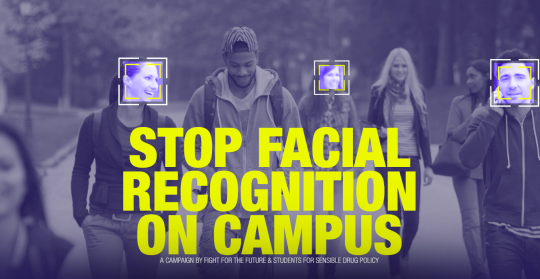More than 40 organizations stand with students and faculty against facial recognition on campuses

FOR IMMEDIATE RELEASE: Thursday, February 13
Contact: Evan Greer, press@fightforthefuture.org, 978-852-6457
Leading consumer, privacy, and civil liberties organizations say that facial recognition doesn’t make campuses safer, and call on administrations to protect students privacy by committing to not using facial recognition.
A coalition of more than 40 leading consumer, privacy, and civil liberties organizations released a sign on letter today led by Fight for the Future to add their support to the growing campaign urging administrators to keep dangerous facial recognition technology off of college and university campuses. The signers span the political spectrum and include the ACLU, FreedomWorks, National Center for Transgender Equality, Liberty Coalition, Electronic Frontier Foundation, Color of Change, Jewish Voice for Peace, Jobs with Justice, Consumer Federation of America, Mijente, Campaign for a Commercial Free Childhood, and the National Immigration Law Center.
Many of these groups are engaged in efforts to pass legislation at the local, state, and federal levels to rein in facial recognition technology. But because this invasive technology poses a profound threat to academic freedom, they are speaking out against its use in schools. The groups state in a letter, released today, that “exposing students and educators to facial recognition profoundly limits their ability to study, research, and express freely without fear of official retaliation.”
“Just imagine you’re in college—exploring new ideas, meeting new people, going to parties, dating, attending rallies,” said Evan Greer, Deputy Director of Fight for the Future (pronouns: she/her). “Now imagine doing all of that while under constant surveillance, not knowing who is watching you, what’s happening to your biometric data, or what the implications of that may be. There is no way to protect students’ rights and ability to thrive at college when the school uses facial recognition technology.”
“While we ultimately believe that facial recognition should be banned across the board, we’re specifically calling out colleges and universities because they are being targeted by unscrupulous companies, aggressively marketing their tech to colleges and claiming that facial recognition can increase campus safety, streamline attendance, and even measure whether students are paying attention. But the truth is there is no justifiable reason to use it,” continued Greer. “Claims that it increases safety are unfounded, and using it as a tool of convenience puts the privacy and rights of students and faculty at risk, for little-to-no benefit.”
“Face surveillance is invasive, unethical, and it doesn’t work, especially on young people, women, and people of color,” said Jake Martinez, director of youth programs at the New York Civil Liberties Union. “This mass surveillance experiment does not belong in our public spaces, and certainly not in our schools. Students should not have to give up their privacy and take part in this dangerous project as a prerequisite to stepping foot on campus.”
This letter is released just days after the campaign announced a National Day of Action to Ban Facial Recognition from College Campuses. On March 2, students and faculty at schools across the country will organize to reject facial recognition’s false promises of safety, and stand against the idea of biased 24/7 tracking and analysis of everyone on campus.
The campaign, led by Fight for the Future and Students for Sensible Drug Policy, also launched a scorecard of nearly 100 top colleges and universities in the United States that tracks whether they currently use, don’t use (and don’t plan to use), or refused to say if they use facial recognition on campus. Dozens of schools have clarified that they don’t use or plan to use the technology, while about one third have not responded. Three schools—George Washington University, Duke University, and American University—gave vague statements that implied they may have plans to use facial recognition in the future. And UCLA and Tufts University currently use or have plans to use the technology on its campus.
Campuses that have stated they have no intention of using facial recognition include Boston College, Brown University, Columbia University, Colorado State University, Cornell University, Dartmouth College, DePaul University, MIT, Michigan State University, Georgia Tech, NYU, Hampshire College, Kent State University, Rice University, University of Florida, Oregon State University, UPenn, and John Hopkins University. University of San Francisco clarified that it abandoned its controversial facial recognition program in 2016. Activists made multiple attempts to contact every institution on the scorecard. More than 30 schools did not respond after multiple attempts, including Harvard, Yale, Oberlin, Howard University, Ohio State, Reed, and Sarah Lawrence College.
Student groups across the country are also circulating an open letter demanding that facial recognition be banned from their campuses, and are organizing to introduce student government resolutions using a toolkit created by Students for Sensible Drug Policy.
Thousands of students, faculty, alumni, and community members are signing petitions calling for a complete ban on the non-personal use of facial recognition on their campus.
Already, school systems across the country are quietly spending millions conducting unethical experiments with facial recognition software, using it to scan, analyze, and collect sensitive biometric information on tens of thousands of students, parents, and faculty. However, the technology is not widely used at U.S. colleges and universities. This campaign aims to ensure it stays that way.
###

